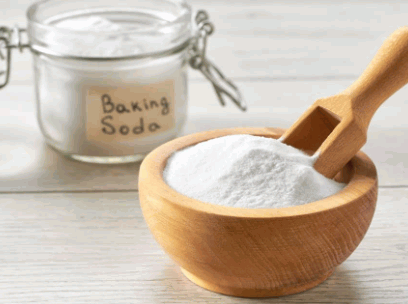Table of Contents
Baking powder is commonly known as a kitchen staple for baking, but it can also be a powerful cleaning agent.
This article explores the fascinating world of baking powder, from its composition and how it works to its surprising safety for household cleaning.
Discover its many benefits, effective cleaning techniques, and the various surfaces it can tackle.
Whether you're looking for eco-friendly cleaning solutions or simply want to freshen up your home, baking powder could be your new best friend.
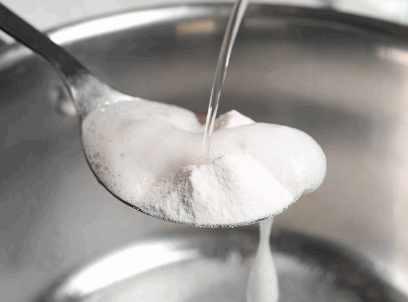
Baking powder is a chemical leavening agent that is widely used in baking to help the dough rise and achieve fluffy textures. It typically contains sodium bicarbonate, which reacts with acidic ingredients to produce carbon dioxide gas, causing the dough to expand. This versatile ingredient is not just limited to the kitchen; it also has a multitude of cleaning applications that can benefit your home. Notably, brands like Molly Maid recommend using baking powder for various cleaning tasks, making it an essential item in every household.
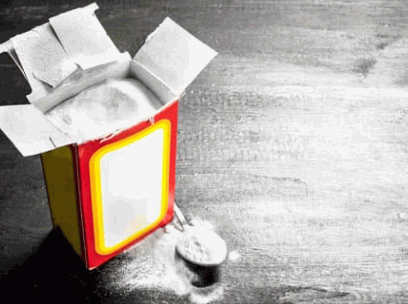
Baking powder works by undergoing a chemical reaction when mixed with moisture and heat, which releases carbon dioxide gas. This gas forms bubbles in the mixture, causing it to rise and creating a light texture in baked goods. Plus its primary use in baking, understanding how baking powder acts as a cleaning agent can help homeowners tackle stubborn stains and odors effectively.
When baking powder encounters water, it activates its acid-base components, typically sodium bicarbonate and an acid such as cream of tartar, leading to an effervescent reaction. This reaction plays a significant role not only in cooking but also in household cleaning.
For instance, when mixed with a little water to form a paste, it can be an excellent solution for removing tough stains from fabrics or surfaces.
Here are a few effective applications:
Utilizing baking powder in these contexts allows for an eco-friendly approach to maintaining a fresh and clean home, making it a versatile staple well beyond the kitchen.
Explore further: Best Way To Clean Laminate Floors
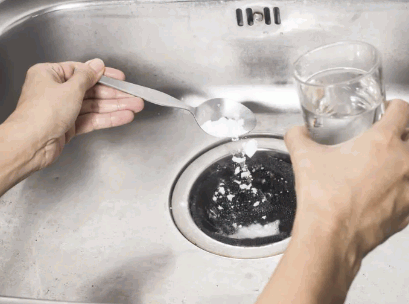
Baking powder is considered a safe and non-toxic option for cleaning various surfaces in your home. Unlike many conventional cleaning products that contain harsh chemicals, baking powder offers a more environmentally friendly alternative. It can be effectively used for cleaning items ranging from toilets to carpets without posing health risks, making it a popular choice among eco-conscious households.
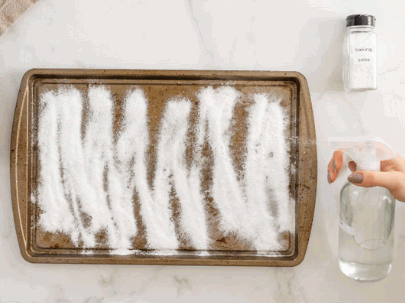
The primary ingredient in baking powder is sodium bicarbonate, commonly known as baking soda, which is a key component that facilitates the leavening process in baking. Baking powder may also contain an acid, typically cream of tartar or another ingredient that activates when mixed with moisture, providing an effective means for achieving rise in baked goods.
This unique combination of ingredients not only serves bakers well but also plays a clever role in household cleaning.
When balancing the needs of both baking and cleaning, many find that while baking soda is great for deodorizing, baking powder is superior when tackling those tougher grime issues, thanks to its additional acidic component that boosts its effectiveness.
While baking powder is generally recognized as a safe cleaning agent, there are potential risks associated with its use that homeowners should be aware of. For instance, when mixed with certain chemical cleaning products, baking powder can lead to unwanted reactions that may produce harmful fumes or residues, compromising both safety and effectiveness.
In particular, combining it with acidic substances, such as vinegar, may release carbon dioxide gas, creating excessive bubbling and potentially causing a mess. Similarly, mixing it with bleach-based cleaners can lead to dangerous reactions that you definitely want to avoid.
To ensure a safe cleaning experience, homeowners should adhere to the following best practices:
It's crucial to remember that while baking powder is a versatile cleaning aid, safety should always come first when employing it in your cleaning routines.
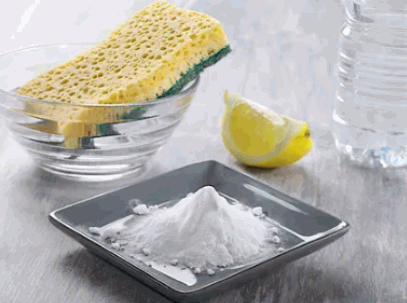
Using baking powder as a cleaning agent offers numerous benefits that make it a valuable addition to any household. Its natural and eco-friendly properties ensure that cleaning tasks are completed without the introduction of harmful chemicals, making it safe for both the environment and your family. Furthermore, baking powder is effective at removing stains, odors, and grime, preserving the fresh ambiance of your living spaces.
Baking powder is a non-toxic and environmentally friendly alternative to conventional cleaning agents, making it a preferred choice for health-conscious individuals. As a natural cleaning agent, it can effectively tackle various household cleaning tasks without the risks associated with chemical residues.
Using non-toxic cleaning products is essential in creating a safe environment, especially for families with children and pets who are more vulnerable to the harmful effects of chemical cleaners. Incorporating baking powder into regular cleaning routines not only helps maintain a clean home but also promotes a healthier living space. Notably, this simple ingredient possesses remarkable odor-neutralizing and stain-removing properties.
By choosing baking powder, one not only protects their family and pets but also contributes to a more sustainable and eco-friendly lifestyle.
One of the most remarkable features of baking powder is its versatility, allowing it to serve multiple purposes in cleaning throughout your home. From deodorizing carpets to scrubbing stovetops, baking powder can replace several specialized cleaners, simplifying your cleaning routine.
This remarkable ingredient proves to be invaluable in various cleaning tasks around the house. Here are some ways it can be utilized effectively:
By utilizing baking powder for these tasks, homeowners can enjoy a cleaner environment while minimizing the need for multiple, often chemical-laden, cleaning products.
Baking powder is particularly effective at removing stubborn stains and odors, making it an invaluable tool in maintaining a fresh and clean living environment. Its natural properties allow it to absorb smells and lift stains from various surfaces, including upholstery and carpets.
Baking powder works by releasing carbon dioxide when mixed with moisture and an acidic substance, creating a fizzing action that helps to lift dirt and grime. For instance, when dealing with greasy stains on clothing, applying a paste made from baking powder and water allows it to penetrate the oil, making it easier to wash away.
Similarly, for freshening up carpets, sprinkling baking powder on the surface, letting it sit for at least 15 minutes, and then vacuuming can significantly reduce odors.
To maximize its stain-removing potential, try combining baking powder with vinegar or lemon juice for tough stains. Their acidic properties enhance the effectiveness of the baking powder, providing a deeper clean for various surfaces.
Another significant advantage of baking powder is its affordability and availability, making it an accessible cleaning solution for everyone. This common household item can be purchased at most grocery stores, ensuring that effective cleaning solutions are always within reach.
This remarkable ingredient not only stands out for its low cost but also offers a viable alternative to expensive, specialized cleaners that often contain harsh chemicals. By incorporating baking powder into a regular cleaning routine, individuals can minimize their household expenses while still achieving impressive results.
This shift not only fosters a healthier environment but also gives the power to people to clean their homes with safe, effective measures.
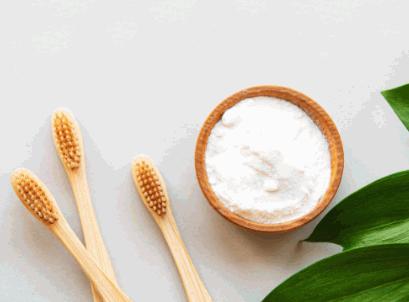
There are several effective cleaning techniques using baking powder, each tailored to meet specific cleaning needs in your household. By understanding the various applications of this versatile ingredient, you can maximize its benefits and tackle a range of cleaning tasks with ease.
Baking powder acts as a mild abrasive cleaner, making it an effective choice for scrubbing surfaces without scratching them. This property allows you to clean delicate items such as silverware or glass without the risk of damage, making it perfect for everyday cleaning tasks.
To fully harness this gentle yet powerful cleaning option, consider the various surfaces you can effectively treat with baking powder. For instance, when tackling kitchen appliances, a simple mixture of baking powder and a little water creates a paste that can easily glide over surfaces, removing tough stains without leaving scratches behind.
As you experiment with different applications, remember that using a soft cloth or sponge is key to maintaining the integrity of the item being cleaned.
As a natural deodorizer, baking powder excels at absorbing unwanted odors, making it an excellent choice for freshening up various areas of your home.
From carpets to refrigerators, its ability to neutralize smells ensures a pleasant and inviting atmosphere. This versatile ingredient can be used effectively in a host of different settings, making it a must-have in any household.
Whether combating the musty smell of shoes or eliminating odors in the microwave, this natural deodorizer proves to be exceptionally effective in creating a fresher environment throughout your home.
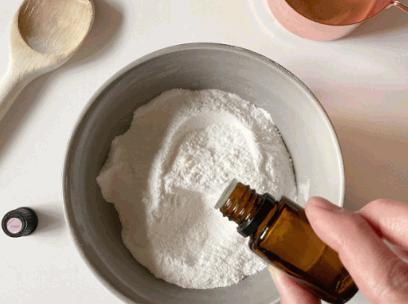
Baking powder can be utilized as an effective stain remover, particularly when combined with water to create a paste. This paste can be applied to stubborn stains on fabrics or carpets to lift discoloration while ensuring that your laundry remains fresh and clean.
To create this powerful baking powder paste, simply mix a small amount of baking powder with enough water to form a thick consistency. Once mixed, you can carefully smear the paste onto the affected area, making sure to cover the stain completely. Allow it to sit for about 30 minutes to let the ingredients work their magic before rinsing or washing.
This technique is especially beneficial for various types of stains such as grease, coffee, or red wine.
Incorporating this method into your routine can result in noticeable improvements in your cleaning efforts, making it a simple yet effective solution for maintaining the cleanliness of your home.
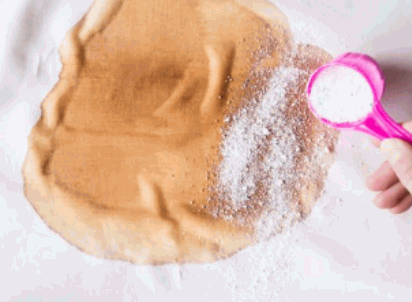
Baking powder is suitable for cleaning a wide variety of surfaces in your home, making it a versatile cleaning agent that can handle various cleaning tasks. From kitchen countertops to bathroom tiles, understanding the appropriate surfaces for baking powder can help maximize its effectiveness and ensure a clean environment.
Baking powder is excellent for cleaning kitchen countertops, as it effectively removes stains and deodorizes surfaces. Its unique composition allows it to break down tough grease while leaving behind a fresh scent, making it an ideal choice for maintaining a healthy cooking environment. Simply sprinkle baking powder on the counter, scrub gently, and rinse with warm water for a sparkling finish.
To fully take advantage of this versatile cleaner, follow these simple steps:
With these steps, the kitchen countertops will not only look polished but also smell fresh, creating a comforting atmosphere for cooking.
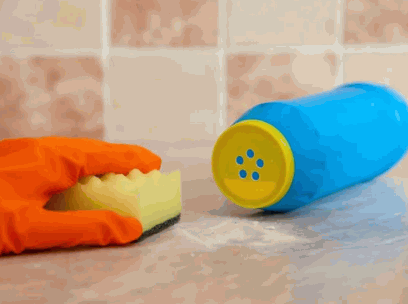
To clean bathroom tiles and grout, baking powder can be mixed with water to create a paste that helps remove tough stains and grime effectively. Applying this paste and allowing it to sit for a few minutes before scrubbing will yield impressive results.
Plus its stain-lifting properties, this method is particularly advantageous for tackling hard water stains and mildew that often accumulate in damp environments. For best results, take a step-by-step approach:
Following this, a light mist of vinegar can enhance the cleaning power, fizzing up any remaining grime. Rinse thoroughly with warm water for a gleaming finish. Regular maintenance is key; a quick wipe down with a vinegar solution once a week can help prevent build-up and keep surfaces sparkling clean.
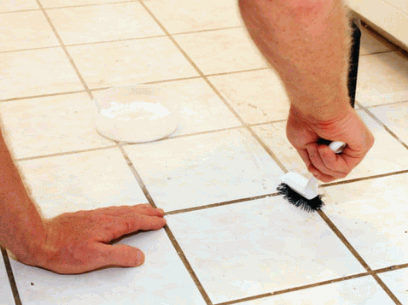
Baking powder is particularly effective for deodorizing carpets and upholstery, as it can absorb unwanted smells and freshen the fabric. By sprinkling baking powder on carpets and letting it sit before vacuuming, you can achieve an inviting scent and remove lingering odors.
To maximize its effectiveness, it is essential to follow a few best practices when using this versatile powder. Start by ensuring the carpet or upholstery is clean and free from debris. After sprinkling a generous amount of baking powder over the affected area, utilize a soft brush or cloth to gently rub it into the fibers, allowing it to penetrate deeply. For optimal results, let it sit for at least 15 to 30 minutes to enjoy its full deodorizing benefits.
This simple yet effective method not only eliminates bad smells but also freshens your home’s atmosphere, making it a go-to solution for any fabric-covered surfaces.
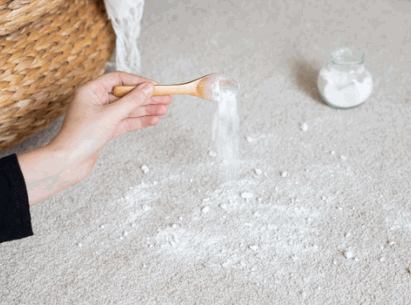
For stainless steel appliances, baking powder can be used as a gentle cleaner that effectively removes stains while being non-abrasive. Creating a paste with water allows you to scrub away grime without scratching the surface.
This safe and accessible solution helps eliminate unsightly fingerprints and tough stains that often accumulate on the shiny exterior of kitchen equipment.
To use it effectively, begin by gathering your materials:
Mix a few tablespoons of baking powder with enough water to create a thick paste. Gently apply this mixture to the stained areas of the appliance, allowing it to sit for about 5-10 minutes for optimal results. Using circular motions, softly scrub the surface with your cloth or sponge to lift the residue.
It's crucial to avoid using abrasive materials, as they can scratch and dull the stainless steel finish. After scrubbing, simply wipe the appliance with a damp cloth, followed by a dry towel to restore its shine and brilliance.
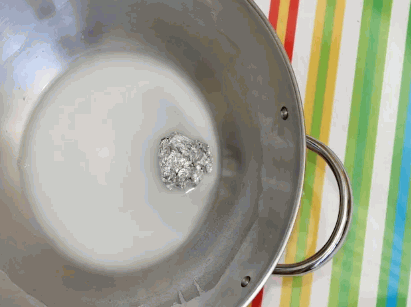
Baking powder can also be effective for cleaning glass surfaces and mirrors, as it helps remove smudges and fingerprints without leaving streaks. By mixing baking powder with vinegar, you can create a powerful cleaning solution for shiny surfaces.
To prepare this effective cleaner, start by combining two tablespoons of baking powder with half a cup of vinegar in a bowl. This mixture will fizz and bubble, so be prepared for a little reaction. Once the fizzing subsides, stir until you achieve a smooth paste.
Apply the paste onto the glass or mirror using a soft cloth or sponge, ensuring it covers all affected areas. For best results, wipe the surface clean in a circular motion, which helps lift dirt more effectively.
After the initial cleaning, rinse the surface with water and dry it thoroughly. This step is crucial for a streak-free finish.
To maintain clarity in your glass and mirrors, regularly wipe them down with a gentle microfiber cloth and this mixture. Repeat this cleaning process every few weeks, or as needed, to keep glass surfaces sparkling like new!
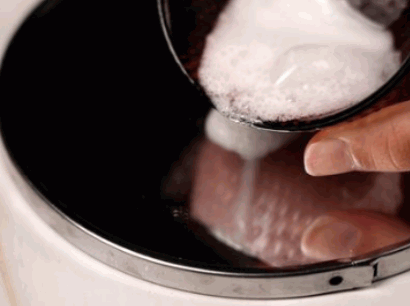
Creating a baking powder cleaning solution is simple and can be tailored to tackle specific cleaning tasks around your home. By mixing baking powder with water or vinegar, you can develop an effective cleaning solution for various surfaces.
To maximize the cleaning potential of your homemade solutions, consider experimenting with different proportions depending on the grime you face. For light cleaning, a simple mixture of one tablespoon of baking powder and two cups of warm water is sufficient. Conversely, for tougher stains, combine one cup of baking powder with one-half cup of vinegar; this produces an invigorating fizz that helps lift stubborn spots.
For optimal storage, keep your baking powder solutions in a sealed container and label them for easy identification. Always shake well before using to ensure uniformity and effectiveness. Remember, testing on a small, inconspicuous area is crucial to prevent any damage to finishes.
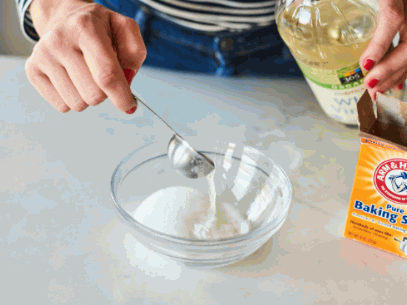
While baking powder is an excellent cleaning agent, there are several alternatives available that can also provide effective cleaning solutions. Eco-friendly options such as vinegar, baking soda, or specialized natural cleaning agents can complement or substitute baking powder in various cleaning tasks.
